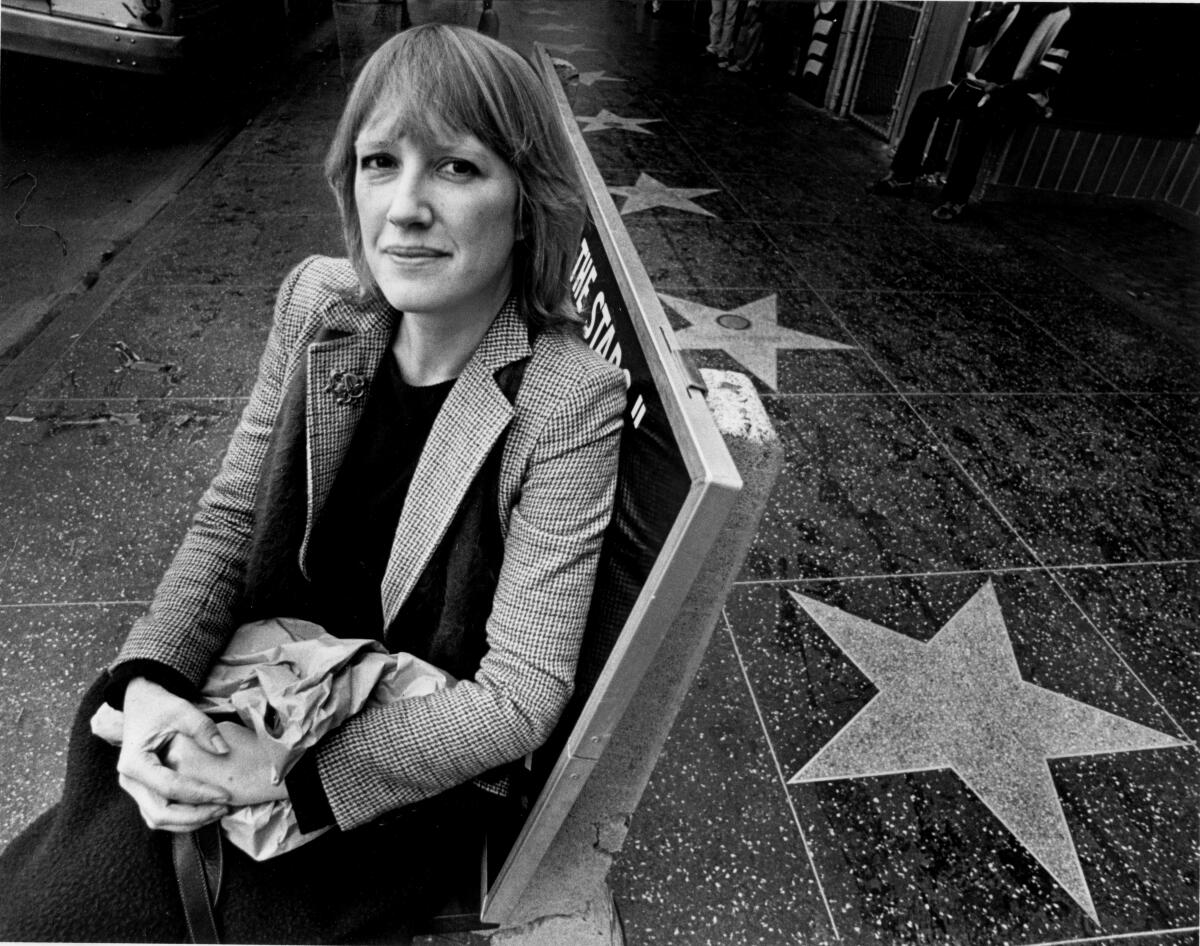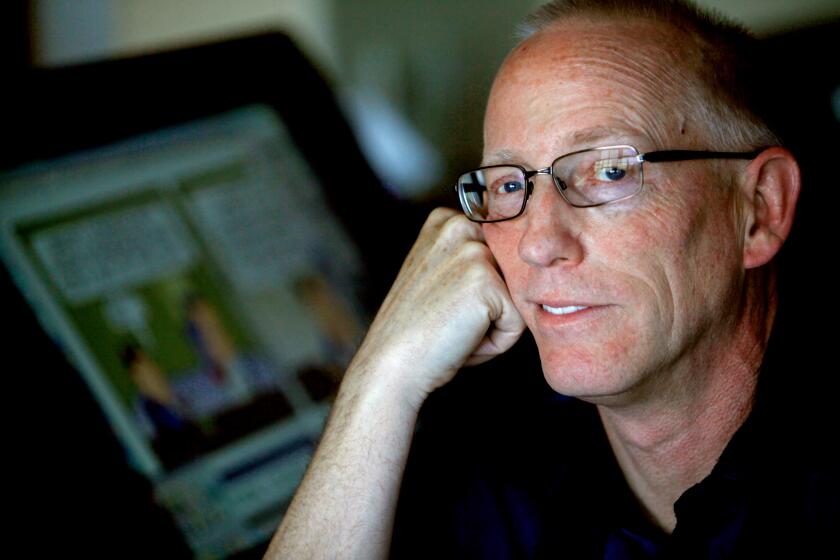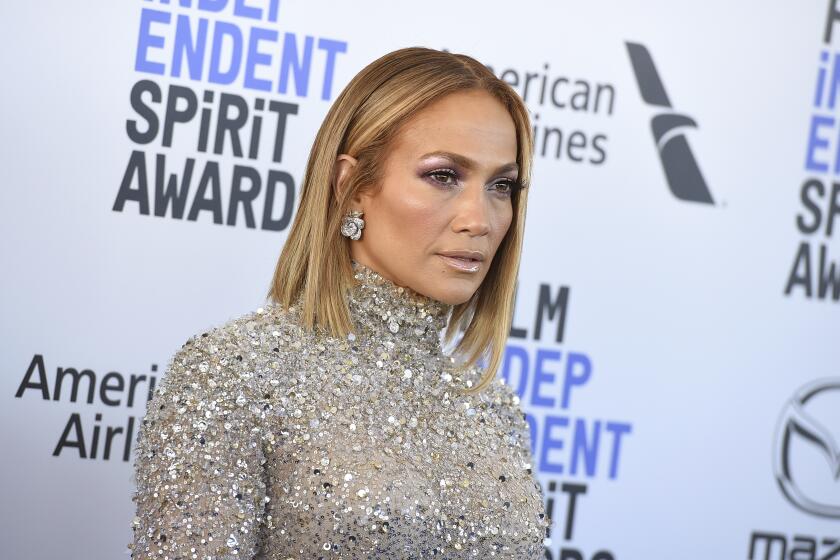All about Eve Babitz: Artists Ed and Paul Ruscha on the late L.A. icon

- Share via
The jacket of my 1982 copy of “L.A. Woman” says, “Eve Babitz holds the primal knowledge of what it is to be a woman in what she convinces us is the capital of civilization.”
That capital is, of course, Los Angeles, and when Babitz died last week, a part of the city went with her. She embodied the permissive and pleasurable reputation of her native Hollywood, offering a breathy laugh over all of its endemic contradictions and frustrations.
With Colette as role model, her love affairs were material for her stories and, like the French author, she treated them with drollity and affection. She never married but had dozens of boyfriends throughout her life, many of whom remained besotted with her.
For Eve, sexual frankness was an expression of her power. Certainly, that is the case in Julian Wasser’s 1963 photograph of her sitting naked at a chessboard with the Dada artist Marcel Duchamp. The photograph was Eve’s self-styled revenge on her married lover Walter Hopps, then curator of the Pasadena Art Museum, who had organized the show. “I always wanted him to remember me that way,” she told me. Babitz told me so many of these stories that it led me to construct my 2011 book, “Rebels in Paradise: The Los Angeles Art Scene and the 1960s,” as a narrative about that decade.
Though she survived decades of hard partying, Eve was felled by an accident in 1997 when the ash from a cigarillo torched her polyester skirt while she was driving. The fabric seared onto her skin, leaving her with third-degree burns. She was hospitalized for months, and those boyfriends and girlfriends came through with the funds to help her recovery. Harrison Ford: $100,000. Steve Martin: $50,000. A benefit at the Chateau Marmont brought donated art by Ed Ruscha, Larry Bell, Billy Al Bengston, Ed Moses, Ron Cooper and other artists, musicians and actors she had befriended. Yet she never fully recovered, and she disappeared socially and creatively afterward. She died Friday at age 78.
Artists Ed Ruscha and his brother, Paul Ruscha, were longtime friends of Eve’s and involved with her off and on for decades. I asked them to share memories of her.
Hunter Drohojowska-Philp: Do you remember your first impressions of Eve?
Ed Ruscha: Oh, it was the early ’60s, but she was a great part of my growing up. I know I was with her when Jack Ruby shot Lee Harvey Oswald. I was in bed with Eve and we were watching this on live TV, a little black-and-white set. So you can date me from there anyway and probably earlier.
But anyway, she lived in this house behind her parents’ house. She kept a sloppy quarters because she had a lot of cats who had their way. Her parents lived up at the front house on Bronson near Franklin. And I knew her parents well. Mae was a beautiful, sweet Texan who was an artist, and she drew pictures of the gingerbread houses on Bunker Hill. And Sol was the musician, violinist. They were very sweet people. So I would see Eve a lot in those early days, but right away I could see that she seemed to have everyone’s number. She was real quick to spot hypocrisy in any way.
She could be infuriating, confounding, but at the same time, she was very funny, streetwise and serious. I noticed that people were constantly checking in with her, to get her view on things, and then there was Mirandi, of course, who was the perfect sister. They were able to play off of one another.
HDP: Did you ever double-date when [artist] Joe Goode was dating Mirandi?
ER: We went to Musso and Frank’s. That was Eve’s favorite spot and mine too. And we would go to openings, go to Barney’s Beanery, places that were hot at the time. In the early ‘60s, she was always talking about Walter Hopps. She even wrote a rough screenplay on Walter Hopps, and I recall buying the rights from Eve. I read all her books and I found them to be dead on. She was committed to her writing. I’ve always thought about her as like being carved out of marble. Even her name, Eve, suited her.
HDP: Didn’t you do a drawing of her name?
ER: I did, with really soft lines. Very faint. I don’t know whatever happened to that. But I think she had to sell almost everything. She’s never really made any wise choices for finances or money. She didn’t seem to care about making it, and she was more interested in the daily thinking of just her culture in the world.
HDP: Was yours an exclusive arrangement or loose?
ER: In the 1960s? No, no, it was loose and spotty. I guess that’s just the way we lived back then. But always having good feelings about each other, and I never really had a conflict with her.
HDP: Do you think she introduced you to some ideas about old Hollywood glamour that would have been influential for you?
ER: It was an abstract connection that she was able to spin yarns that she found and talk about things. Somehow she just knew a lot of people and had a damn good life. If you ask me, an enviable life.
HDP: Do you think that she had any influence on you in terms of the evolution of your own art?
ER: Oh, I guess I’m influenced by everything. There’s nothing that crosses my path that doesn’t influence me in some way or other. Even if I reject it, I’m influenced by it. And, so, sure. I mean, she was a strong figure and I think everybody respected her. All the artists respected her, and and we were curious about her because she was a hot number. She did well with it, you know. (laughs)
HDP: How did she come to be Paul’s girlfriend?
ER: I passed her on to him. (laughs)
Paul Ruscha: No. (laughs) I came to L.A. in 1973. We met at Jack’s Catch All; it was this great thrift store. I was a veteran thrift shopper and so was Danna [Ed Ruscha’s wife]. She introduced me to Eve, who said, “I’d like to have you over for dinner.” Danna said, “I think she likes you.” Eve knew that Ed and I were friends with [fashion model] Leon Bing. So she called Leon, who told Eve, “Well, no matter what you make for him, be sure that it’s loaded with cilantro because he’s just crazy about cilantro.” Eve put it in the salad and the soup, and I hate cilantro and I couldn’t eat it. All I could do is laugh. She called me the next day and she said, “I hope you let me make it up to you because I am a pretty good cook.” So then we were just locked into each other.
It was great. I loved her cooking. It was very chuckwagon style, you know, where she tossed the cats off of the stove. If I spent the night with her, she’d wake up before I did and then want me to leave. So she’d throw coffee into a pot of boiling water and bang on it to make the grounds go down and to wake me up and say, “OK, here’s your coffee. Now get out of here.” And I’d laugh and then she’d say, “I think I’ve got something I’d like you to read.” Then I’d read whatever she’d written the day before. I gave her my critique, and if she liked it, she let me stay, and if she didn’t, she’d throw me out. So that was weird, but it worked for what it was. She loved to talk about her boyfriends. It was always fun and interesting to hear what was going on in their lives.
But we never lived together. After I got my house in the Valley, she would come over and stay with me, but because she was a Taurus I always called her the bull in my china shop. She just couldn’t go anywhere without ruining something. She’d knock something over or break something, and the same thing at her house. I remember a couple of fur coats I gave her, and one of them she threw over this little space heater that she had. It caught on fire and it burned up her garage.
HDP: What was her lasting influence on you?
PR: She always did have an incredible way with language when she spoke. She never elaborated. She was just a woman of few words, but they were always words that counted. And I loved that about her.
HDP: I think she would be happy that her friends are sharing these stories and talking to each other.
PR: About her! (laughs)
More to Read
The biggest entertainment stories
Get our big stories about Hollywood, film, television, music, arts, culture and more right in your inbox as soon as they publish.
You may occasionally receive promotional content from the Los Angeles Times.










